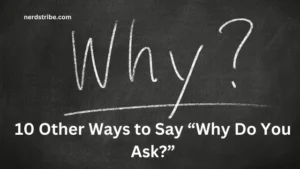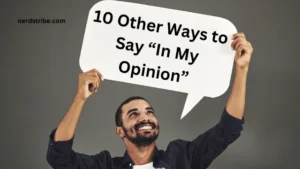The word “bro” has become a universal way to refer to friends, siblings, or even acquaintances in a casual and friendly tone. But have you ever stopped to think about how often you use it?
What if you want to switch things up and add a bit of variety or creativity to your vocabulary? While “bro” is undeniably popular, the English language offers countless alternatives that can express the same camaraderie and bond in unique ways.
Language evolves, and so does the way we express ourselves. Whether you’re trying to add humor, cultural flair, or just mix things up, finding different ways to say “bro” can keep conversations lively and interesting. It’s not just about sounding cool; it’s about creating connections through language. The words we choose can shape how others perceive us and the relationships we build.
In this blog, we’ll explore 10 fresh, fun, and meaningful alternatives to “bro.” Each option will bring its unique tone and vibe to your conversations, whether you’re chatting with your closest friends or meeting new ones. Let’s dive into the alternatives and find the perfect fit for every moment.

Contents
1. Dude
A classic alternative that’s casual and widely used in English-speaking countries.
- Key Meaning: Refers to a male friend in an easy-going, informal way.
- Usage: Works well in almost any casual setting.
- Example: “Hey dude, what’s up?”
- Why It’s Effective: It’s simple, relatable, and universally understood.
2. Buddy
A warm and friendly term that conveys closeness and familiarity.
- Key Meaning: Highlights friendship and a supportive bond.
- Usage: Often used when offering help or showing care.
- Example: “Don’t worry, buddy. I’ve got your back!”
- Why It’s Effective: It feels comforting and approachable.
3. Pal
A slightly old-school yet charming way to address a friend.
- Key Meaning: A term for a close companion or associate.
- Usage: Great for informal chats with friends.
- Example: “Let’s grab a drink later, pal.”
- Why It’s Effective: It adds a touch of nostalgia and warmth.
4. Homie
A term rooted in urban culture that emphasizes loyalty and closeness.
- Key Meaning: Refers to someone from your inner circle or community.
- Usage: Works best in casual or slang-heavy conversations.
- Example: “You’re always there for me, homie!”
- Why It’s Effective: It’s relaxed, relatable, and full of personality.
5. Mate
Popular in British and Australian English, this term is a global favorite.
- Key Meaning: Refers to a friend or peer, often used in place of “bro.”
- Usage: Perfect for casual conversations in international settings.
- Example: “How’s it going, mate?”
- Why It’s Effective: It’s globally recognized and culturally versatile.

6. Boi
A playful, internet-era variation of “bro” that’s popular in memes and online culture.
- Key Meaning: Adds humor and youthfulness to conversations.
- Usage: Ideal for casual online chats or jokes.
- Example: “You’ve got to see this, boi!”
- Why It’s Effective: It’s trendy, modern, and makes any interaction fun.
7. Fam
A short form of “family,” often used for close friends you consider like family.
- Key Meaning: Highlights deep connections and trust.
- Usage: Common in urban and youth culture.
- Example: “You’re my fam, no matter what.”
- Why It’s Effective: It emphasizes loyalty and closeness.
8. Chief
A lighthearted way to address someone with respect or playfulness.
- Key Meaning: Suggests leadership or authority in a friendly way.
- Usage: Often used humorously or as a compliment.
- Example: “You’re the real deal, chief.”
- Why It’s Effective: It’s unique and adds a playful edge to conversations.
9. Partner
A versatile term that conveys trust and camaraderie, especially in professional settings.
- Key Meaning: Refers to someone you collaborate or connect with.
- Usage: Great for professional or casual relationships.
- Example: “Looking forward to this project, partner.”
- Why It’s Effective: It’s versatile and can be formal or informal.
10. Ace
A cheerful and energetic way to refer to a friend who’s exceptional.
- Key Meaning: Suggests excellence and confidence.
- Usage: Often used in British slang or for praising someone.
- Example: “You nailed it, ace!”
- Why It’s Effective: It’s fun, positive, and unique.
Conclusion
Finding new ways to say “bro” isn’t just about being creative—it’s about expressing connection in ways that resonate with you and the people around you. Each alternative brings its own flair, tone, and depth to your interactions, helping you connect with others in a more personal and meaningful way.
Whether you prefer the laid-back vibe of “dude,” the playful edge of “boi,” or the loyalty conveyed by “fam,” these options allow you to adapt your language to different situations and relationships. Language is a tool for building relationships, and the words you choose can leave a lasting impression.
So the next time you’re tempted to say “bro,” try one of these alternatives instead. You might just find that it makes your conversations more engaging and memorable.
FAQs
Why should I use alternatives to “bro”?
Using different terms adds variety, creativity, and personalization to your conversations.
Which alternative is best for professional settings?
Terms like “partner” or “chief” work well in formal or semi-formal environments.
Can I use these alternatives with female friends?
Absolutely! Words like “buddy” or “fam” are gender-neutral and inclusive.
Are these terms culturally specific?
Some terms like “mate” or “homie” are more common in specific regions but can be used globally.
Which term is the most casual?
“Dude,” “boi,” and “homie” are great for relaxed and informal settings.
How do I choose the right term?
Consider the context, your relationship with the person, and the tone you want to convey.








